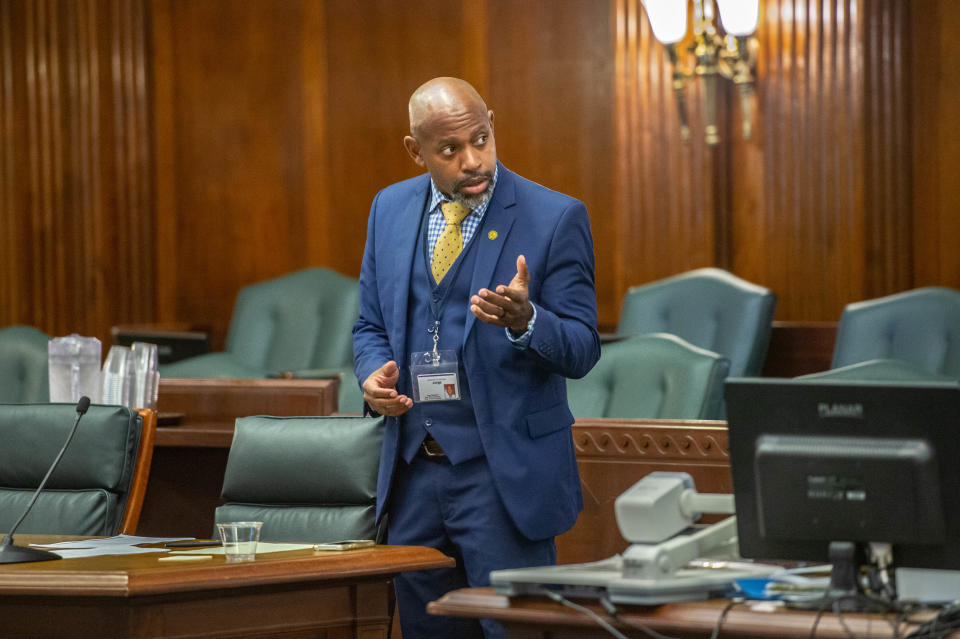Data: Buncombe County's Black youths disproportionately sent to criminal justice system
ASHEVILLE — New data presented at a recent Juvenile Crime Prevention Council meeting shows that a disproportionate number of complaints against Buncombe County’s Black youths are filed into the criminal justice system than are filed against other youth populations.
Crime prevention and youth mentoring leaders say the statistics are concerning and highlight inequalities that need to be addressed.
The School Justice Partnership — an agreement started in 2020 among law enforcement and school, county, city and court officials — is attempting to mitigate what’s termed the “school-to-prison” pipeline. But change is slow, and some school resource officers continue to petition the court to review cases of students for behaviors the partnership says should be handled within the schools or diverted somewhere other than the courtroom.
“What’s concerning is the reality that BIPOC (Black, Indigenous and People of Color) kids are five times more likely to receive a complaint and petition than white kids,” Jorge Redmond, chair of the JCPC, told the Citizen Times.
“It reassures our notion that there is a pipeline to prison and there’s inequality that we need to address within our community.”
Black youths account for 9% of the total population of ages 6-17 in Buncombe County. Yet, they received 32% of delinquent and undisciplined complaints for fiscal year 2022-23, according to data from the N.C. Department of Juvenile Justice.
The percentage of Black youths jumps even higher when factoring how one juvenile may receive multiple complaints. A total of 695 complaints were brought against 385 individual juveniles, of whom 113 — or 49% — were Black.
“(The numbers) should surprise me, but they don’t,” said Keynon Lake, founder of My Daddy Taught Me That, a local, Black-led nonprofit that supports young men through advocacy, education and mentoring.

School board adopts SB 49 policies: Asheville schools adopts SB 49 policies; Board chair calls law 'misguided and obtuse'
Why the gap?
Lake said he feels there's "a gambit of things" contributing to Black children receiving a disproportionate number of referrals to the juvenile justice system in the county, including poverty, not having the same amount of access to resources and, perhaps most importantly, the achievement gap that the area's Black students face.
In Buncombe County Schools, 21% of Black students grades three to eight were considered proficient in math in the 2021-22 school year, compared to 61% of white students who were considered proficient — making that a 40-percentage point difference. In reading, 21% of Black students in the same grades were considered proficient compared to 57% of white students.
A similar achievement gap is present at Asheville City Schools, where only 11% of Black students grades three to eight were considered proficient in math in the 2021-22 school year based on end-of-year standardized tests, compared to 66% of white students who were considered proficient. That's a 55-percentage point gap.
The same gap was present in reading scores, where 13% of Black students in the same grades were considered proficient, compared to 75% of white students, marking a 62-percentage point gap.
More: 'As a Black man, I'm appalled': Report shows gap between Black, white student achievement
"Kids don't want to be laughed at or targeted at their school, so if I'm not able to read on a grade level, if I'm two grade levels behind, I know what my peers are going to think of me," Lake said. "So, let me just do something that's going to get me kicked out of class."
Both Lake and Redmond highlighted the need for more diversity in teachers. "Probably 90-something percent of teachers in Buncombe County are probably white," Redmond said.

"It’s not necessarily the fact that you want to have someone of the same color teaching you, but I feel like there comes a time where there’s empathy and understanding of what someone goes through based upon culture awareness and understanding what that looks like," Redmond said.
"And possible behaviors change when kids see themselves in other roles and see people in other roles that look like them."
Redmond also mentioned how socio-economic dynamics in Asheville may play a part, particularly with nutrition and patience.
"For example, a kid may come in hungry, and they continue to act out for whatever reason that may not be something that’s related to school, it could be something at home," Redmond said.
Buncombe School Board lawsuit: Child sexual abuse lawsuit: Family sues Buncombe County Board of Education
Changing response to victimless crimes: a tiered approach
Lake asserted that if a child is participating in criminal behavior, there should be consequences for their actions. But he also highlighted the dire effects that accumulating a record for more minor behaviors while in school can have on youths, such as their ability to get into colleges and universities.
"Are we going to throw away the key because a kid got smart with a teacher or disobeyed the rules? We got to understand the differences and dynamics, and also what we're sacrificing."
The School Justice Partnership was signed in 2020 by seven district court judges, Mayor Esther Manheimer, Sheriff Quinten Miller, former Asheville police chief David Zack, District Attorney Todd Williams, Buncombe County Board of Education Superintendent Tony Baldwin and former Asheville City Schools Superintendent Bobbie Short, among others.
The partnership seeks to reduce the number of referrals into the justice system while preserving safety due to the “negative impact” it can have on students, according to a copy obtained by the Citizen Times.
“What we tried to push back on is victimless crimes for the schools to handle for the most part, unless there seems a repetitive instance for the child,” Redmond said, adding that this is the first year the county “has more of a tier or table of certain offenses and how they’re going to address them through administration or through the courts.”
In Buncombe County, all youths referred to the juvenile justice system for delinquent acts receive a screening from Juvenile Court Counselors using an assessment that measures risk, need and strength/protective factors. A summary report in December 2023 by JCPC analyzed data of 526 youth assessed between July 1, 2022, and June 30, 2023.
Regarding school-based complaints, the data showed much higher numbers of complaints filed by schools than the state. Only 7% of youths assessed through counselor screenings experienced interventions by school administrators, down from 17% last year and trailing behind the statewide percentage of 12%.
A total of 49% of youths assessed had police reports filed by schools, which the report said is "significantly higher" than the state average of 27%.
Based on the data for fiscal year 2022-23 from the N.C. Department of Juvenile Justice, there were 340 total school-based complaints in Buncombe County, 118 or 35% of which were for Black students.
Crimes not reported to NC School Board: Asheville City Schools crimes: weapons, rapes not reported to NC School Board?
NC ACLU: 'The most expansive and concerning' laws
“One of the things we looked at is disorderly conduct and how that may be something that needs to have a tiered response as opposed to immediately putting it into the court system,” Redmond said. "(A charge of) disorderly conduct can vary very differently."
The American Civil Liberties Union of North Carolina released a report in October 2023 on policing in schools, in part analyzing the use of disorderly conduct charges. The ACLU called the law pertaining to disorderly conduct in schools, N.C. Gen. Stat. § 14-288.4(a)(6), "the most expansive and concerning criminal laws applicable to school-based conduct."
This law makes it a crime to “disrupt, disturb, or interfere with teaching,” or to “disturb the peace, order or discipline” at or around any school. Though the student’s conduct must “amount to a substantial interference” with school instruction in order to be criminal, it requires a judgment call from police officers on what behavior crosses the line into criminal.
The N.C. ACLU claims the law leaves a wide berth for biases or perceptions to interfere with that judgement call, implicit or otherwise. They cited state-wide data showing over the past six years that Black students were subject to over 55% of disorderly conduct referrals even though Black youths make up under 23% of the youth population in North Carolina.
Despite the push to shift away from petitioning the court for disorderly conduct behavior in schools, Redmond said, "there is an occasional instance where there are SROs in particular that are still pushing some of those through" — though they have seen a decline.
“It becomes one of those things that they fall back into, although we’ve had several discussions with DJJ (Department of Juvenile Justice) and SROs about how we’re moving forward," Redmond said. "We knew it wouldn’t be automatic where we’d see this sort of shift. It would take time for that to occur and a little bit of pushback.”
Ryley Ober is the Public Safety Reporter for Asheville Citizen Times, part of the USA Today Network. Email her at [email protected] and follow her on Twitter @ryleyober
This article originally appeared on Asheville Citizen Times: Buncombe County Black youth disproportionately sent to justice system
